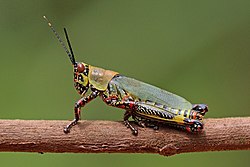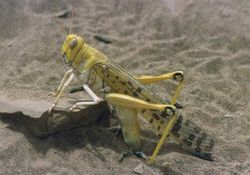Orthoptera
Orthoptera are an order of insects.[1] The order contains grasshoppers, katydids, and crickets. "Ortho" means "straight", so "Orthoptera" means "straight wings". This means the front wings, called tegmina, are stiff, straight, and not used for flying. The back wings are membranous and are folded like a fan under the front wings when the insect is not flying. Many species use their wings to make sounds, which we usually call "chirping" noises.
| Orthoptera | |
|---|---|

| |
| Patanga japonica | |
| Scientific classification | |
| Kingdom: | |
| Phylum: | |
| Class: | |
| Subclass: | |
| Infraclass: | |
| (unranked): | |
| Order: | Orthoptera
|
Life cycle
Orthopteran insects start life in an egg case. After three weeks – or when spring comes – the tiny nymphs come out from the egg case. After four or five molts, they have wings. This shows that they are adults and are ready to reproduce.
Sound production
Their sounds are produced by using file-like edges to their wings, or wing veins. In some groups the wing edges are rubbed together, in others the hind limb is rubbed against a wing edge. Each sound is unique to the species, and its function is identification for mating purposes. It is males which make the sound, and females move towards it.[2]
Diet
In the order Orthoptera, members chew their food, using their mandibles (jaws). Crickets are omnivores, which means they eat both plants and animals. Actually, they will eat almost anything: vegetables, cereal, and even their own mate if they are hungry enough. Katydids are mostly herbivores (plant eaters), though they will eat their own mate, too, if they are hungry enough. They also enjoy eating aphids and other small, slow-moving creatures. Grasshoppers almost always eat plants like grass, wheat bran, and lettuce, and they can be terrible crop pests.
Jumping
It's quite hard to catch a member of Orthoptera because they jump so well. They have amazing legs - a grasshopper can jump 20 times farther than the length of its body. Their back legs are very large and long. These long, strong legs give these insects their great ability to jump.[2]
Suborders
Crickets, katydids, and grasshoppers are in the same order of Orthoptera because they are alike in many ways. However, there are several things that make them different from each other.
First, their colors are usually quite different. Since grasshoppers like to move during the daytime, their colors are similar to grass and bright flowers, making them usually green, light brown, or multicolored (lots of different colors at once). Crickets move at night, so they are dark. Katydids like to spend a lot of time on leaves, so they are often leaf-colored, and their wings can look like leaves. Their wings can have the same vein patterns as leaves, and they often have little brown spots just like the ones that might be found on a leaf.
Secondly, their behaviors are different. Grasshoppers like being active in the day; crickets, at night; katydids, in the late afternoon and evening.
Thirdly, their antennae is different. Katydids and crickets usually have long, thin antennae, while grasshoppers usually have short, thick ones. Of course, this rule does is not perfect – for instance, even though grasshoppers usually have short, thick antennae, the long-horned grasshopper has long, thin antennae like a cricket. Because of this, it is still sometimes hard to tell the members of this order apart.
Orthoptera Media
Related pages
References
| Wikispecies has information on: Orthoptera. |
- ↑ Hoell H.V; Doyen J.T. & Purcell A.H. 1998. Introduction to insect biology and diversity. 2nd ed, Oxford University Press, pp. 392–394. ISBN 0-19-510033-6
- ↑ 2.0 2.1 Imes, Rick (1992), The practical entomologist, Simon and Schuster, pp. 74–75, ISBN 0-671-74695-2 [1]










